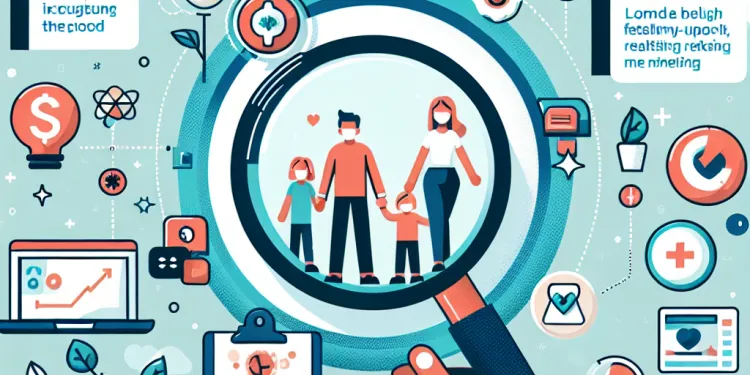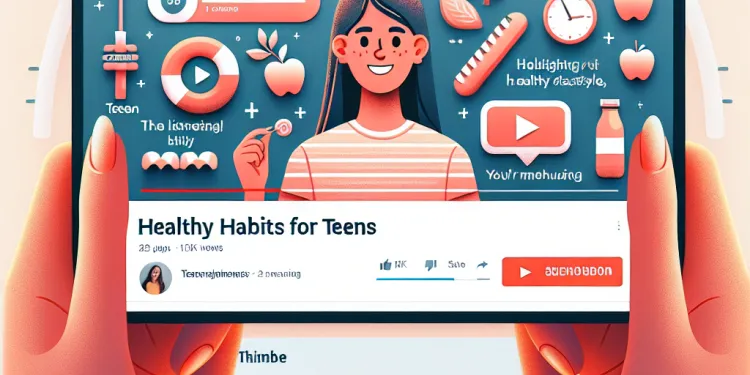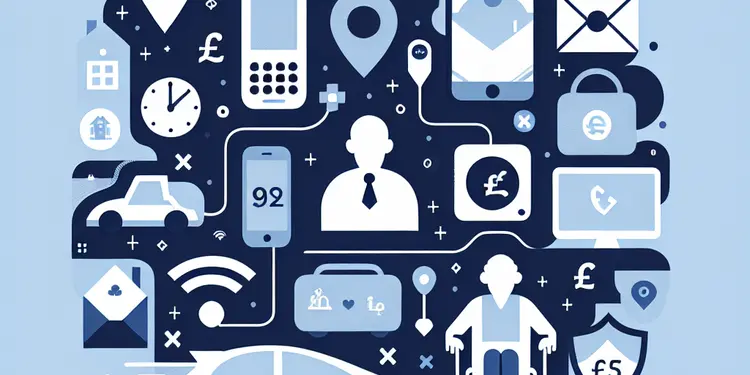
Find Help
More Items From Ergsy search
-

Are UK's Post-Pandemic Work Habits Harming Mental Wellbeing?
Relevance: 100%
-

Are UK's Post-Pandemic Work Habits Harming Mental Wellbeing?
Relevance: 99%
-

Healthy Family Lifestyle Tips Post-Pandemic
Relevance: 42%
-

Walking to Work: A Simple Habit That Could Transform Your Lifestyle
Relevance: 37%
-

Healthy Habits for Teens
Relevance: 32%
-

Study Finds Alarming Increase in Childhood Obesity Rates Post-Pandemic
Relevance: 31%
-

How does walking to work impact mental health?
Relevance: 30%
-

Essential Tips for Mental Health and Well-Being Amidst Rising Living Costs
Relevance: 28%
-

NHS Launches Digital Platform to Support Mental Wellbeing
Relevance: 26%
-

How Rising Living Costs Are Impacting Family Wellbeing
Relevance: 25%
-

Understanding Mental Health in Children
Relevance: 24%
-

Mental Health Support Resources in the UK
Relevance: 23%
-

Staying Active: National Health Campaigns Promoting Physical Well-being
Relevance: 23%
-

How can technology be used to monitor the driving habits of seniors?
Relevance: 22%
-

Mental Health Support for Families - Latest Resources and Guidance
Relevance: 22%
-

Social Services and Well-being (Wales) Act: Assessments
Relevance: 21%
-

Mental Health Resources for Families
Relevance: 21%
-

Mental Health Support for Families: Resources and Helplines
Relevance: 21%
-

Can primary care support workers access mental health support?
Relevance: 21%
-

Mental Health Support Resources for Families
Relevance: 21%
-

Navigating Mental Health Services for Children and Adolescents
Relevance: 21%
-

Tackling Youth Mental Health: Community Initiatives and Solutions
Relevance: 21%
-

Mental Health Impact of Cost of Living Crisis and Support Resources
Relevance: 21%
-

Mental Health Support Services in the UK
Relevance: 20%
-

Can relationship problems be resolved to improve mental health?
Relevance: 20%
-

Mental Health Support for Families: Resources and Guidance
Relevance: 20%
-

What mental health resources are available for seniors?
Relevance: 20%
-

Advancements in Mental Health Resources for Families
Relevance: 20%
-

How can I stay motivated to walk to work regularly?
Relevance: 20%
-

Has the social media ban been successful in improving children's mental health?
Relevance: 20%
-

What are the signs that weight loss jabs are working?
Relevance: 20%
-

How does sugar impact mental health?
Relevance: 19%
-

Social Prescribing Link Workers are part of new health and wellbeing services in NHS surgeries
Relevance: 19%
-

Mental Health Support for Families: Resources and Strategies
Relevance: 19%
-

Can mixed exercises improve mental health?
Relevance: 19%
-

Record Number of Brits Embrace Plant-Based Diets for Wellbeing
Relevance: 19%
-

Accessing Mental Health Support Resources in the UK
Relevance: 19%
-

How do eating disorders affect mental health?
Relevance: 19%
-

New Mental Health Strategy Launched to Address Youth Anxiety Epidemic
Relevance: 19%
-

What impact can weight loss drugs have on mental health?
Relevance: 19%
Are UK's Post-Pandemic Work Habits Harming Mental Wellbeing?
Introduction to Post-Pandemic Work Habits
The COVID-19 pandemic drastically altered work habits across the globe, with the UK experiencing significant shifts. The adoption of remote work, flexible hours, and hybrid models became the norm for many employees. As restrictions eased, companies faced decisions about whether to maintain these new practices. While some returned to traditional office setups, others continued with or adapted hybrid models. This transition sparked discussions on the implications for employees' mental wellbeing.Positive Impacts of Hybrid Work Models
Hybrid work models have offered several advantages, notably in mental wellbeing. The flexibility to work from home has allowed many employees to achieve a better work-life balance, reducing stress associated with commuting and rigid work hours. Workers report increased satisfaction and productivity, attributing this to more time for family, hobbies, and rest. Additionally, autonomy over one's work schedule can lead to enhanced employee morale and reduced burnout rates.Challenges and Mental Wellbeing Concerns
However, these new work habits are not without challenges. The blurring of boundaries between work and home life can lead to overworking and difficulty in disconnecting, impacting mental health negatively. Social isolation remains a significant concern, with potential implications for wellbeing. Many workers miss the camaraderie and support of workplace interactions. Moreover, inconsistent access to resources and a conducive work environment at home can create stress and anxiety, affecting performance and wellbeing.Employer Responsibilities and Support Strategies
Employers play a critical role in safeguarding the mental health of their workers. Efforts to support mental wellbeing include establishing clear boundaries around work hours, ensuring regular virtual team meetings to foster connection, and providing access to mental health resources. Implementing strategies to maintain work-life balance and encouraging breaks and time off is vital. Employers must actively listen to employee feedback and adapt policies to meet evolving needs.The Path Forward
The UK's future work landscape will likely continue evolving, influenced by both employer policies and employee preferences. A focus on integrating mental wellbeing into work culture is essential. As new patterns emerge, ongoing assessment and adjustment of work practices will be crucial to foster a healthy, productive workforce that thrives in a post-pandemic world. Prioritizing mental health is not only beneficial for employees but also essential for organisational success.Frequently Asked Questions
How have post-pandemic work habits changed in the UK?
Post-pandemic work habits in the UK have shifted towards more remote and hybrid working models, with many businesses adopting flexible working arrangements.
Are these new work habits affecting mental wellbeing?
Yes, while flexible work can improve work-life balance for some, it can also lead to feelings of isolation, increased stress, and difficulty separating work from personal life for others.
What are the benefits of remote work?
Remote work offers benefits such as reduced commuting time, increased flexibility, and the potential for a better work-life balance.
What challenges do employees face with hybrid working models?
Employees might struggle with maintaining boundaries between work and home life, experience feelings of isolation, and face difficulties in collaborating effectively.
How can employers support mental wellbeing in a hybrid work environment?
Employers can support mental wellbeing by promoting regular check-ins, offering mental health resources, encouraging time off, and fostering an inclusive company culture.
What role does technology play in post-pandemic work habits?
Technology is essential for enabling remote work, but it can also lead to over-reliance on digital communication and contribute to 'always-on' work culture.
Is social interaction declining due to remote work?
Remote work can reduce casual interactions and social dynamics found in offices, which may impact teamwork and a sense of community.
How can employees maintain mental wellbeing while working from home?
Employees should establish a dedicated workspace, maintain a regular schedule, take breaks, and seek virtual social connections to support their mental wellbeing.
What impact does remote work have on productivity?
Remote work can increase productivity for some, due to fewer distractions, but can decrease it for others, who may find it hard to focus or communicate efficiently.
Has the demand for mental health services increased post-pandemic?
Yes, there has been an increase in demand for mental health services, partly due to stress and anxiety related to new work habits and isolation.
What strategies can companies implement to reduce burnout?
Companies can implement strategies such as encouraging regular breaks, offering flexible hours, setting clear expectations, and recognising employee achievements.
How does the work-from-home setup affect junior employees?
Junior employees might find it challenging to receive mentorship and professional development opportunities in a remote setup compared to in-office environments.
What are some signs of poor mental wellbeing in remote workers?
Signs include increased fatigue, irritability, lack of motivation, withdrawal from colleagues, and difficulty concentrating on tasks.
How important is routine in maintaining mental health while working remotely?
Having a routine helps provide structure and balance, making it easier to manage work and personal time, thus supporting mental health.
What future trends might affect UK work habits and mental wellbeing?
Trends include increased adoption of AI and automation, ongoing flexibility in work arrangements, and a stronger emphasis on mental health support within workplaces.
Useful Links
This website offers general information and is not a substitute for professional advice.
Always seek guidance from qualified professionals.
If you have any medical concerns or need urgent help, contact a healthcare professional or emergency services immediately.
Some of this content was generated with AI assistance. We’ve done our best to keep it accurate, helpful, and human-friendly.
- Ergsy carfully checks the information in the videos we provide here.
- Videos shown by Youtube after a video has completed, have NOT been reviewed by ERGSY.
- To view, click the arrow in centre of video.
- Most of the videos you find here will have subtitles and/or closed captions available.
- You may need to turn these on, and choose your preferred language.
- Go to the video you'd like to watch.
- If closed captions (CC) are available, settings will be visible on the bottom right of the video player.
- To turn on Captions, click settings .
- To turn off Captions, click settings again.
More Items From Ergsy search
-

Are UK's Post-Pandemic Work Habits Harming Mental Wellbeing?
Relevance: 100%
-

Are UK's Post-Pandemic Work Habits Harming Mental Wellbeing?
Relevance: 99%
-

Healthy Family Lifestyle Tips Post-Pandemic
Relevance: 42%
-

Walking to Work: A Simple Habit That Could Transform Your Lifestyle
Relevance: 37%
-

Healthy Habits for Teens
Relevance: 32%
-

Study Finds Alarming Increase in Childhood Obesity Rates Post-Pandemic
Relevance: 31%
-

How does walking to work impact mental health?
Relevance: 30%
-

Essential Tips for Mental Health and Well-Being Amidst Rising Living Costs
Relevance: 28%
-

NHS Launches Digital Platform to Support Mental Wellbeing
Relevance: 26%
-

How Rising Living Costs Are Impacting Family Wellbeing
Relevance: 25%
-

Understanding Mental Health in Children
Relevance: 24%
-

Mental Health Support Resources in the UK
Relevance: 23%
-

Staying Active: National Health Campaigns Promoting Physical Well-being
Relevance: 23%
-

How can technology be used to monitor the driving habits of seniors?
Relevance: 22%
-

Mental Health Support for Families - Latest Resources and Guidance
Relevance: 22%
-

Social Services and Well-being (Wales) Act: Assessments
Relevance: 21%
-

Mental Health Resources for Families
Relevance: 21%
-

Mental Health Support for Families: Resources and Helplines
Relevance: 21%
-

Can primary care support workers access mental health support?
Relevance: 21%
-

Mental Health Support Resources for Families
Relevance: 21%
-

Navigating Mental Health Services for Children and Adolescents
Relevance: 21%
-

Tackling Youth Mental Health: Community Initiatives and Solutions
Relevance: 21%
-

Mental Health Impact of Cost of Living Crisis and Support Resources
Relevance: 21%
-

Mental Health Support Services in the UK
Relevance: 20%
-

Can relationship problems be resolved to improve mental health?
Relevance: 20%
-

Mental Health Support for Families: Resources and Guidance
Relevance: 20%
-

What mental health resources are available for seniors?
Relevance: 20%
-

Advancements in Mental Health Resources for Families
Relevance: 20%
-

How can I stay motivated to walk to work regularly?
Relevance: 20%
-

Has the social media ban been successful in improving children's mental health?
Relevance: 20%
-

What are the signs that weight loss jabs are working?
Relevance: 20%
-

How does sugar impact mental health?
Relevance: 19%
-

Social Prescribing Link Workers are part of new health and wellbeing services in NHS surgeries
Relevance: 19%
-

Mental Health Support for Families: Resources and Strategies
Relevance: 19%
-

Can mixed exercises improve mental health?
Relevance: 19%
-

Record Number of Brits Embrace Plant-Based Diets for Wellbeing
Relevance: 19%
-

Accessing Mental Health Support Resources in the UK
Relevance: 19%
-

How do eating disorders affect mental health?
Relevance: 19%
-

New Mental Health Strategy Launched to Address Youth Anxiety Epidemic
Relevance: 19%
-

What impact can weight loss drugs have on mental health?
Relevance: 19%


